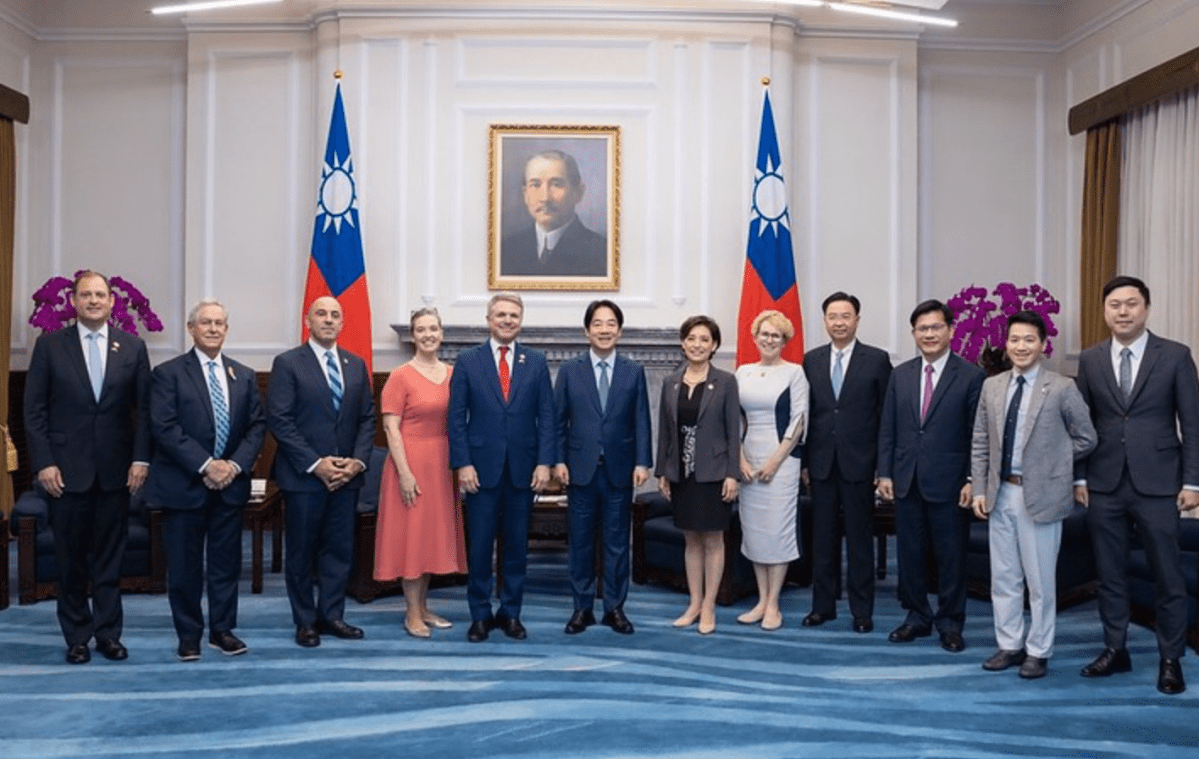A bipartisan group of United States lawmakers met with the new Taiwanese President in Taipei on Monday after the People’s Liberation Army held large-scale joint exercises near Taiwan last week.
The delegation of six House members, led by Michael McCaul, chairman of the House Foreign Affairs Committee, is the first group of US officials to visit Taiwan after the island’s President Lai Ching-te took office on May 20.
On May 24, the Chinese army concluded two days of military drills near Taiwan in response to Lai’s inauguration speech, which was seen by Beijing as a promotion of “Taiwan independence.”
“The forces of China conducted intimidating military exercises, sending 111 aircrafts and 46 warships, demonstrating that they are not interested in taking Taiwan by peaceful means, as agreed to in the Taiwan Relations Act in 1979,” McCaul said in an opening speech during a meeting with Lai.
“All democracies must stand together against aggression and tyranny,” he said. “Whether it’s Putin in Russia, the Ayatollah in Iran or Chairman Xi next door to us in China, an unholy alliance is eroding peace around the world.”
After the meeting with Lai, McCaul held a joint press briefing with Taiwanese Foreign Minister Lin Chia-lung.
McCaul said the latest PLA drills were essentially a preview of what a blockade of the Taiwan Strait would look like. He said it is important to make sure Taiwan has the weapons necessary for deterrence. He also said Washington will bolster Taiwan’s defense by speeding up the delivery of defensive weapons from the US.
“We are moving forward on those weapons systems. I’d like to see them faster, but they are forthcoming,” he said.
Lin said the US delegation’s visit to Taipei is an “important gesture of solidarity that shows America stands firmly with democratic Taiwan.”
“We urge relevant members of the US Congress to stop playing the ‘Taiwan card,’ stop interfering in China’s internal affairs, stop supporting and conniving at ‘Taiwan independence’ separatist forces and stop undermining China-US relations and cross-Strait peace and stability,” Mao Ning, a spokesperson of the Chinese Foreign Ministry, said in a media briefing on Monday.
“Taiwan is an inalienable part of China’s territory. China firmly opposes military contact between the US and Taiwan and any attempt to arm Taiwan,” she said. “We will take necessary measures to firmly defend national sovereignty and territorial integrity.”
Commenting on the Foreign Ministry’s recent decision to sanction 12 US defense contractors and 10 senior executives, Mao said no country, organization or individual shall imagine that they could step on or even cross the line on the Taiwan question without paying any price.
She reiterated that the Taiwan question is at the core of China’s core interests, and the first red line that cannot be crossed in China-US relations.
In April 2023, China imposed sanctions on McCaul after he visited Taiwan. Beijing accused him of having frequently interfered in the country’s internal affairs and sent wrong signals to “Taiwan independence” separatists.
According to the sanctions, McCaul is not allowed to enter China while his property in China has been frozen since last year.
Nvidia’s Jensen Huang
When McCaul arrived in Taipei on Sunday, Nvidia’s Chief Executive Jensen Huang, dubbed as the Godfather of AI, landed in the city on the same day.
Taiwanese media said Huang will deliver a speech on the “New Industrial Revolution” to more than a thousand people in the city on June 2.
He will also discuss a manufacturing contract with Hon Hai Technology to ensure the supply of Nvidia’s GB200 chip, which consists of one Grace central processing unit (CPU) and two Blackwell graphic processing units (GPUs).
A GB200 NVL72, an exascale computer connecting 36 Grace CPUs and 72 Blackwell GPUs in a single rack, can provide up to 30 times performance compared to a computer with the same number of H100 Tensor Core GPUs.
Hon Hai Technology’s shares rose 5.11% to TWD185 (US$5.75) on Monday.
Huang said in May last year that Nvidia is going to build a world-class AI research center in Taiwan. He said the company will hire 1,000 people and invest up to TWD24.3 billion for this facility.
Nvidia’s AI ambition in Taiwan is seen as a part of the island’s plan to upgrade itself from a chip manufacturer to an AI service provider.
In his inauguration speech on May 20, Lai not only called for strengthening the national defense and national security law in Taiwan, but also vowed to build a global democratic supply chain that includes Taiwan and like-minded countries.
“Today, Taiwan masters advanced semiconductor process technology and stands at the center of the artificial intelligence (AI) revolution,” Lai said. “It is the key to the ‘global democratic supply chain’ and affects the development of the world economy as well as the happiness and prosperity of human life.
He said Taiwan has applied for membership of the Comprehensive and Progressive Agreement for Trans-Pacific Partnership (CPTPP) and will continue to sign bilateral investment agreements with democratic countries to deepen its trade relations with them.
He said Taiwan will push forward the development of five industries, which include semiconductors, AI, military industry, security monitoring and next-generation communications. He said the government will encourage overseas Taiwanese firms to return to their home country and invest.
Read: Nvidia to turn Taiwan into a world-class AI hub
Follow Jeff Pao on Twitter at @jeffpao3



war, war, and more war – thats what the US is, a war machine, there aint no talk of mediation or effort to promote understanding between both sides, but war, war weapons, weapons etc etc … whatever the US touches it all turn to ash …
Indeed.